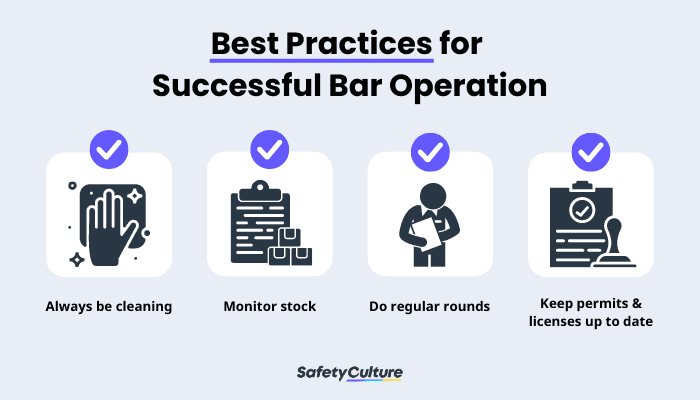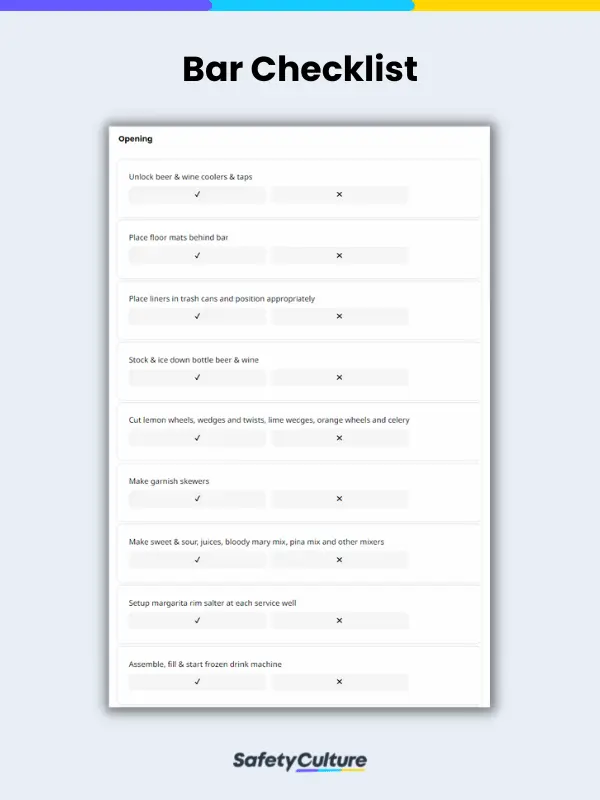What is a Bar Checklist?
A bar checklist is used to ensure that bar operation procedures are followed on a regular basis. This tool can be used by bar managers and waitstaff as a guide when preparing for, during, and after operations. Using a bar checklist helps bar managers comply with established standards and regulatory requirements to prevent fines and government-sanctioned closure. It also helps in streamlining operations while delivering consistent quality and service to patrons.
Why Use One?
Although the rules surrounding bars—which fall under the food and drinks services industry—are generally similar to one another, they can also vary according to the local regulations and the specific policies of a particular business.
One way of ensuring that everyone—from bar owners, managers, and staff that covers different shifts—is all on the same page is to use tools that allow them a comprehensive overview of the business. This includes ready-to-use checklists or templates that enumerate which items and bar areas should regularly be inspected to avoid any mishaps before, during, and after operations.
Digitally employing bar checklists further increases efficiency and provides people involved in bar operations with more accurate data and information to work with. As well, these checklists being accessible to all staff and accomplished as often as necessary is ideal for the business in order to reach optimum results.
What Should a Bar Checklist Include?
A bar checklist helps bar owners, managers, and staff operate their businesses more efficiently. It also includes procedures, duties, and best practices on a day-to-day basis. A general bar checklist consists of:
- Duties to perform before opening the bar
- Activities during operations
- Tasks upon closing the bar
It is also necessary to always include the signature of the assigned personnel that oversees the daily bar operations.
Best Practices for Successful Bar Operation
Managing a bar means frequently switching from one task to another. it’s easy to miss important steps. Here are the top 4 best practices you need to remember to successfully operate your bar:

1. Always be cleaning.
The cleanliness of a bar is important for passing health inspections and maintaining a good reputation:
Before opening, inspect equipment, glasses, plates, utensils, tables, and bathrooms to ensure that they have been cleaned and sanitized. Spot clean areas and items where applicable.
During operations, implement regular walkthrough inspections to identify areas that need cleaning. Look out for spills, food crumbs, trash, and dirt accumulation. Common areas for cleaning include the front bar, customer tables, floors, and bathrooms. Regularly dispose of trash bins before they overflow.
Before closing, clean the back bar, tables, and bathrooms. Sanitize kitchenware and glassware in preparation for the following day’s work.
2. Monitor stock.
The worst-case scenario for a bar is running out of stock in the middle of operations. Even if liquor and food inventory has already been performed before opening, check stocks periodically throughout the night to ensure that supplies meet demands.
3. Do regular rounds.
Do regular walkarounds and occasionally ask customers if they are happy with the service and if there is anything that can be improved. Observe staff members in the kitchen, bar, and service areas and check if they are following standard operating procedures for quality and safety. Take immediate action to diffuse tense situations between customers and staff members and eject disorderly persons if necessary.
4. Ensure permits/licenses are updated.
Without the correct permits and licenses, a bar cannot operate. Business and liquor licenses usually require renewal after a year but may vary depending on your country or state. Take note of expiration dates to avoid hefty fines and suspensions.
FAQs About Bar Checklists
An opening and closing checklist for bars is a document that lists the activities to complete prior to opening and after closing a bar. This usually includes the items to check and tasks to perform and is normally used by bar staff that covers different shifts.
Having a detailed opening and closing bar checklist helps ensure streamlined and safe daily operations for the business. This also serves as a guide in complying with regulatory requirements, local policies, and industry best practices.
First, make sure that the checklist to be used is comprehensive and will cover all the important aspects of the operation. Utilizing pre-made checklists that include general bar maintenance tasks is already ideal, but being able to modify them to cater to specific business needs is even better.



